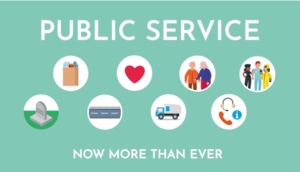|
Getting your Trinity Audio player ready...
|
Did you know that some countries offer free public services such as healthcare or education? These are called public services because they benefit everyone regardless of nationality. In addition to these five, there are also other types of public services that aren’t necessarily free. Find out about them below.
Public services are those provided by governments at no cost to citizens. They include things like healthcare, education, transport, water supply, waste management, electricity distribution, postal services, pensions, social security, banking and insurance. The government provides these services through various agencies and departments. Some of these are run by local authorities, while others operate under central government control.
What does the term ‘public service’ mean? 
A public service is a good or facility offered by an authority to the general population and available for use without charge. You should ask questions like: Who runs it? Can I join/use it? Is it free? It’s important to understand the difference between public services and private businesses. Governments frequently provide services but do not own or operate them; they’re provided by another body within the system (for example, city councils fund hospitals via their budgets). Similarly, although many companies may be publicly listed and traded, their operations and products are privately owned and funded.
Social Security
This includes pension payments, unemployment benefits, sickness allowances, maternity pay, disability allowance, and carer’s allowance. All EU members have a system known as social security but it can vary a lot depending on the member state. Two examples: in Germany, it is sometimes forgotten how much contributions were paid into this system when the worker was employed; in Spain, it might not be remembered that there are any benefits at all for retirees.
Healthcare
There are many different agencies across Europe which provide health care for people who cannot afford private treatment. These include the NHS (National Health Service), the French “Sante” and German “Bewegungsarmen Wohlfahrtssystem”.
Education
One example is the European Credit Transfer System (ECTS). It is an evaluation tool used to measure educational attainment involving credits and grades.
Water supply
Water is often available for nothing. People do not usually connect water usage with costs. If customers want to see meters installed, then this will be done with the help of the regional councils. The country may charge a fee to make up for the costs of providing service. For instance, Scotland has the lowest per-capita consumption of fresh water in the world & Ireland has one of the highest charges for domestic connections.
Transport
Public transport can be cheap or expensive. A ticket price can range from £0.20 to over £100. Many countries now sell travel passes or cards so that access can be easier. Here we use the word ‘transport’ to refer to cars, buses, trams, underground, light rail, subways, ferries, etc.
Compulsory Free Public Services
There are many countries around the world which provide compulsory free public services including healthcare, education, water supply, energy generation and roads. The list includes Belgium, Denmark, Finland, France, Germany, Greece, Iceland, Italy, Luxembourg, Netherlands, Norway, Portugal, Spain, Sweden, Switzerland, the United Kingdom and Australia.
Law Enforcement
Police forces are very common throughout the whole of Europe. They exist to keep disorder and crime under control and, generally speaking, they do a pretty good job of keeping you safe. However, they do not always act impartially – think about race issues, corruption and discrimination. Note that not every country has police officers. For example, Denmark does not have a national police force, but only local ones.
Defense
Some nations spend more than others on defence. But, what does ‘defence’ actually mean? Do we need to defend ourselves against other countries? Or, go abroad to protect our rights? Some people look down upon military spending as if money could buy happiness, peace and prosperity. Others think that nations need to take pride in their armed forces because wars bring glory and honour. And some believe that a strong army can stop the war from happening altogether.
The Role of Public Services.
Public Services International offers a database where users can find out everything from the availability of public services to information on the cost of living in a particular area including accommodation, food, utilities, taxes, crime, schooling, climate and more.
The Bottom Line.
When looking at the list above, it’s easy to assume that most of the items on the list are free. Nothing is free though but if you are looking for free services you can play free online casino games online . All the services mentioned above either have a cost associated with them or require payment.